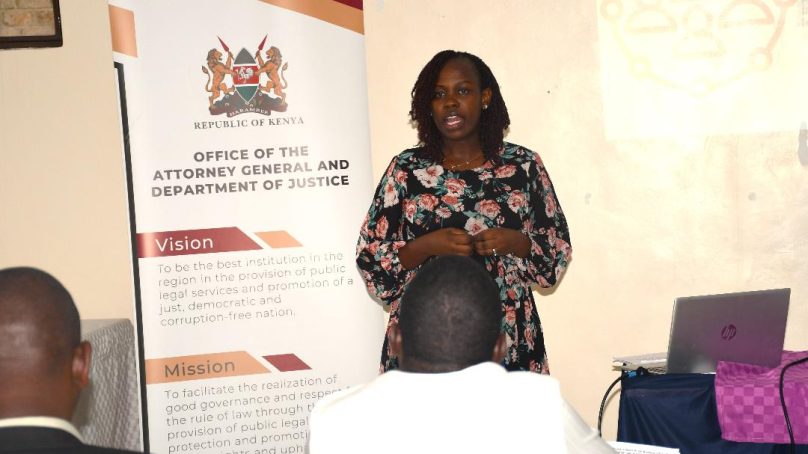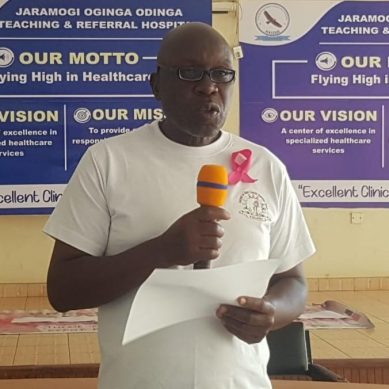
Persons and entities convicted of corruption will face a mandatory 10-year ban from participating in public tenders, under sweeping reforms proposed in the Anti-Corruption Laws (Amendment) Bill 2025, a provision which is among the most stringent measures yet aimed at tackling entrenched graft in Kenya’s public sector.
The proposed law seeks to amend several key anti-graft statutes, including the Anti-Corruption and Economic Crimes Act, to disqualify any individual, corporate body, or unincorporated body convicted of corruption from being awarded public contracts, which is a deterrent measure targeting repeat offenders and firms that enable corruption through procurement fraud.
Speaking during the public participation event held at ACK Holy Trinity Church in Kericho Town, Principal State Counsel in the Office of the Attorney General Claries Kariuki explained that the amendments are designed to tighten legal loopholes that allow corrupt individuals to retain influence in public offices through proxies or under different business entities.
Ms Kariuki who led the forum, enlightened the participants that the proposed law also introduces a six-month time limit for the conclusion of anti-corruption cases to reduce prolonged litigation and promote faster delivery of justice. This, she said, is in response to criticism over delays in prosecuting high-profile economic crimes that often results in loss of evidence and public trust.
“Clause 11 of the Bill proposes to insert a new section 29A in the Anti-Corruption and Economic Crimes Act to provide for the power of the commission to inspect bank accounts, accounts held in non-banking financial institutions, mobile money accounts, money transfer accounts and call data and to apply to the court for orders prohibiting transactions thereon for a period of thirty days,” she added.
Ms Kariuki emphasised that the bill further enhances the powers of investigative agencies to seize, freeze and recover illicit assets and broadens the definition of “proceeds of corruption” to include property derived or indirectly obtained through corrupt practices, even if it has been transformed, intermingled or reinvested.
“Corruption proceeds are no longer limited to direct gains but they now include any asset, benefit or income linked to corruption, even those disguised through laundering or transferred to third parties,” Kariuki pointed out.
The legal team from the office of the attorney-general and department of justice also presented two other bills during the same forum: the Whistle-blower Protection Bill 2025 and the Public Participation Bill 2025, which were opened to scrutiny as part of a nationwide public participation campaign.
Kariuki informed participants that the Whistle-blower Protection Bill 2025 is designed to encourage the reporting of unethical conduct by protecting individuals who disclose information in the public, interest explaining that the bill guarantees confidentiality, immunity from civil and criminal liability, and protection from reprisals such as dismissal or intimidation.
According to Kariuki, the bill obligates all public and private entities to establish secure internal reporting mechanisms and ensures that whistle-blowers are not penalised for good-faith disclosures, even if their claims are not substantiated after investigations.
“The bill defines a whistle-blower as any person with access to or knowledge of improper conduct who makes a report in accordance with the act. It also protects those who assist whistle-blowers in exposing wrongdoing. Legal protection will apply to disclosures concerning both unlawful activity and any conduct deemed dangerous or prejudicial to public interest,” she explained.
The forum brought together a diverse cross-section of Kericho residents, including national and county officials, civil society organisations, religious leaders, legal professionals, representatives of women, youth and persons with disabilities who welcomed the whistle-blower bill, with many citing fears of retaliation as a key reason for underreporting corruption and unethical behaviour.
“If this law is passed and enforced, it will give people the courage to speak out,” Collins Rotich, one of the participants said during the discussion.
The third piece of legislation discussed was the Public Participation Bill 2025, which seeks to formalise how the public engages with government on laws, policies and development plans, outlining minimum standards for participation, timely access to information, inclusive engagement, structured feedback and dispute resolution mechanisms.
Concerns were raised, however, about who should oversee public participation with Human Rights Activist Salim Barnabas arguing against the cabinet secretary being the responsible authority, calling instead for the creation of an independent body to manage the process and submit reports directly to parliament.
The office of the attorney general assured participants that all comments and feedback collected from the forum will be carefully considered and incorporated where necessary before the final drafts of the bills are prepared for legislative debate.
“Those who would still want to give more views on these Bills can still do so through the digital platform https://publicparticipation.statelaw.go.ke ” Ms Kariuki concluded.
- A Tell Media / KNA report / By Kibe Mburu and Daniel Kibet
The Principal State Counsel Office of the Attorney General Claries Kariuki making a presentation during a public participation forum on Anti Corruption Bill, The whistle-blower bill and the Public Participation Bill at ACK holy Trinity, in Kericho Town
Picture 2 ,3 and 4
Kericho residents, including, members of civil society organizations, and religious leaders, submitting their views on the proposed Bills (Anti-Corruption Bill, The whistle-blower bill and the Public Participation Bill) during a public participation forum at ACK Holy Trinity Church in Kericho Town.







